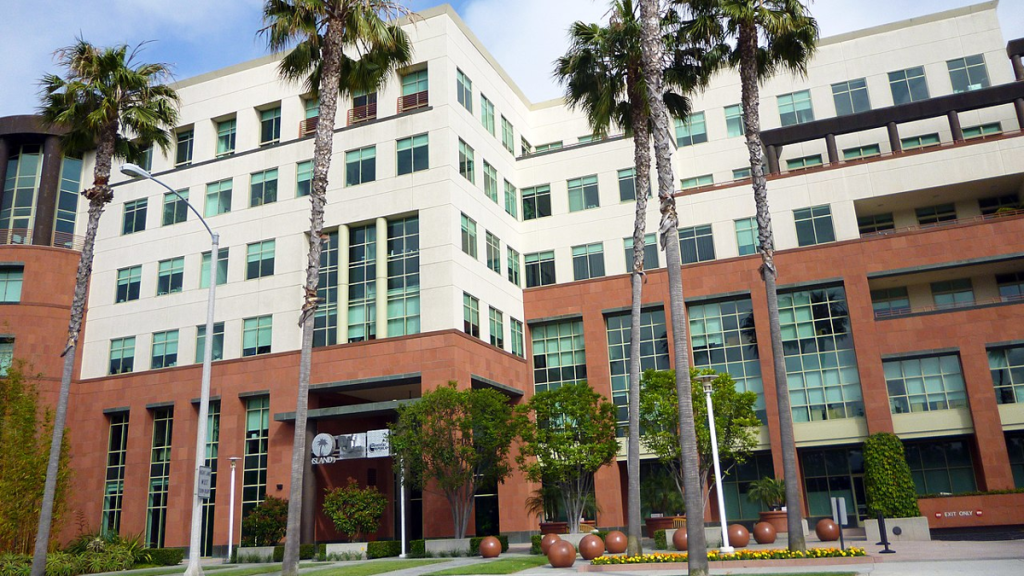
Universal Music Group HQ in Santa Monica, CA (Photo Credit: Coolcaesar / CC by 3.0)
If you enjoyed watching Universal Music Group remove its entire catalog from TikTok, you’ll absolutely love what’s potentially coming next.
For those who enjoy high-stakes showdowns between major media companies and tech giants, Universal Music Group vs. TikTok has been action-packed. But you might need a fresh bowl of popcorn for what’s next.
According to multiple sources leaking details to Digital Music News, UMG has been flooding TikTok with DMCA takedown notices following its stern content removals in late January. But that may be a prelude to more serious legal action in the coming weeks.
As for the takedown notices being sent, one estimate pegged the number of notices ‘in the tens of thousands,’ with TikTok allegedly still hosting enormous quantities of UMG-controlled content despite the recent pulldown.
What happens after TikTok gets banned in the US?
In this comprehensive white paper, DMN Pro breaks down the likely winners and losers in the music industry over the short and long terms. The breakdown spans major and indie labels, publishers, songwriters, various artist tiers, and sync platforms. If Congress hits delete on TikTok, here’s where you’ll likely stand.
Part of the problem involves altered or modified music. Most commonly, songs are sped up, even slightly, though a range of modifications abound on TikTok. Those altered versions become more challenging to detect and remove, but they’re just as infringing. The situation has forced UMG to put teeth to its takedown and chase down remaining songs on the platform.
Under the rules of the Digital Millennium Copyright Act (DMCA) in the US, user-generated platforms are required to remove infringing content when formally notified. A failure to properly comply with a legitimate request can subject the platform to massive infringement penalties if the content isn’t quickly removed.
That’s hardly new: rights owners like UMG have been sending DMCA takedown notices for decades. However, according to sources, those takedown notices are merely the first step in a potentially severe legal attack against TikTok and its Chinese owner, ByteDance.
Here’s how this might work: according to sources with knowledge on the matter, UMG is not only focused on stripping its music from the popular social media site, but also on holding TikTok accountable for failure to comply with the repeat infringer policy, a requirement under the DMCA.
In a nutshell, the DMCA’s repeat infringer policy dictates that platforms must have a procedure for terminating the accounts of repeat infringers or face serious penalties or legal action. In the case of TikTok, it appears that repeat infringers aren’t facing account suspensions or removals — with TikTok either unwilling or unable to successfully scrub its platform of these problematic accounts.
And that’s a potentially huge problem for TikTok.
Suddenly, a more sophisticated strategy is emerging. UMG wants to remove infringing content, but their deluge of DMCA takedowns may also be targeting a serious vulnerability in TikTok’s content management policies.
“Sure, these DMCA takedown notices are part of UMG’s dispute with TikTok, but the goal isn’t really about scrubbing UMG’s music from TikTok,” one source relayed.
Universal Music Group has yet to offer any comment, and it’s unclear if legal filings will emerge. Separately, the parties are understood to be working through a negotiation process, though so far, those talks have yet to bear fruit.
Who owns what?
DMN Pro’s exclusive Music IP Acquisition Tracker covers every IP acquisition deal across masters, publishing, and related assets happening over multiple years. This information simply isn’t available anywhere else — subscribe now to gain access.
Meanwhile, it’s understood that UMG is not just considering, but actively preparing to take legal action within weeks, with DMCA’s repeat infringer policy a crucial part of their upcoming complaints. “They’re not just sending notices; they’re meticulously tracking TikTok’s response to users who have been the subject of multiple notices,” the source continued, while further noting that “TikTok’s inaction” about its repeat infringer issue is a significant concern.
Separately, one informant noted that ‘easily more’ than 100 million videos on TikTok are being muted. That may not include videos with modified music content, altered for fun or specifically to evade detection by UMG or TikTok.
The removal of a vast number of videos from TikTok—now in its eleventh week—has unsurprisingly initiated a wave of discontent among content creators and their audiences. Strategically, TikTok appears willing to ride out those concerns, potentially due to the prevalence of modified workarounds peppering the platform. Separately, Taylor Swift’s decision to “cross the picket line” and license TikTok also makes life easier for ByteDance.
For UMG, dropping the hammer on TikTok helps to safeguard creative assets while sending a stern message. In that context, the Taylor Swift situation—an event labeled as “a big fat disappointment” by one UMG insider—raised concerns about whether other defecting superstars could further weaken UMG’s position.
In response to the relentless takedown campaign by UMG, some content creators are turning to royalty-free music or independently published tracks to continue their work unobstructed by copyright scuffles.
More at this develops.

